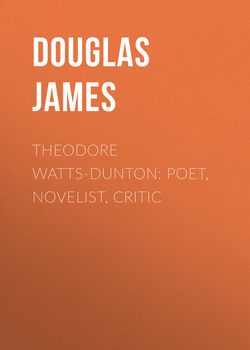Theodore Watts-Dunton: Poet, Novelist, Critic

Реклама. ООО «ЛитРес», ИНН: 7719571260.
Оглавление
Douglas James. Theodore Watts-Dunton: Poet, Novelist, Critic
NATURA BENIGNA
Introduction
Chapter I. THE RENASCENCE OF WONDER
Chapter II. COWSLIP COUNTRY
Chapter III. THE CRITIC IN THE BUD
Chapter IV. CHARACTERS IN THE MICROCOSM
Chapter V. EARLY GLIMPSES OF THE GYPSIES
Chapter VI. SPORT AND WORK
Chapter VII. EAST ANGLIA
Chapter VIII. LONDON
Chapter IX. GEORGE BORROW
Chapter X. THE ACTED DRAMA
Chapter X. DANTE GABRIEL ROSSETTI
Chapter XII. WILLIAM MORRIS
Chapter XIII. THE ‘EXAMINER’
Chapter XIV. THE ‘ATHENÆUM’
Chapter XV. THE GREAT BOOK OF WONDER
Chapter XVI. A HUMOURIST UPON HUMOUR
Chapter XVII ‘THE LIFE POETIC’
Chapter XVIII. AMERICAN FRIENDS: LOWELL, BRET HARTE, AND OTHERS
Chapter XIX. WALES
Chapter XX. IMAGINATIVE AND DIDACTIC PROSE
Chapter XXI. THE METHODS OF PROSE FICTION
Chapter XXII. A STORY WITH TWO HEROINES
Chapter XXIII. THE RENASCENCE OF WONDER IN RELIGION
Chapter XXIV. THE RENASCENCE OF WONDER IN HUMOUR
Chapter XXV. GORGIOS AND ROMANIES
Chapter XXVI ‘THE COMING OF LOVE’
Chapter XXVII “CHRISTMAS AT THE ‘MERMAID’”
Chapter XXVIII. CONCLUSION
Отрывок из книги
Although in the inner circle of English letters this study of a living writer will need no apology, it may be well to explain for the general reader the reasons which moved me to undertake it.
Some time ago a distinguished scholar, the late S. Arthur Strong, Librarian of the House of Lords, was asked what had been the chief source of his education. He replied: “Cambridge, scholastically, and Watts-Dunton’s articles in the ‘Encyclopædia Britannica’ and the ‘Athenæum’ from the purely literary point of view. I have been a reader of them for many years, and it would be difficult for me to say what I should have been without them.” Mr. Richard Le Gallienne has said that he bought the ‘Encyclopædia Britannica’ simply to possess one article – Mr. Watts-Dunton’s article on Poetry. There are many other men of letters who would give similar testimony. With regard to his critical work, Mr. Swinburne in one of his essays, speaking of the treatise on Poetry, describes Mr. Watts-Dunton as ‘the first critic of our time, perhaps the largest-minded and surest-sighted of any age,’ 1 a judgment which, according to the article on Mr. Watts-Dunton in Chambers’s ‘Encyclopædia,’ Rossetti endorsed. In this same article it is further said: —
.....
But, although the main object of this book is to focus, as it were, the many scattered utterances of Mr. Watts-Dunton in prose and poetry upon the great subject of the Renascence of Wonder, I have interspersed here and there essays which do not touch upon this theme, and also excerpts from those obituary notices of his friends which formed so fascinating a part of his contributions to the ‘Athenæum.’ For, of course, it was necessary to give the charm of variety to the book. Rossetti used to say, I believe, that there is one quality necessary in a poem which very many poets are apt to ignore – the quality of being amusing. I have always thought that there is great truth in this, and I have also thought that the remark is applicable to prose no less than to poetry. This is why I have occasionally enlivened these pages with extracts from his picturesque monographs; indeed, I have done more than this. Not having known Mr. Watts-Dunton’s great contemporaries myself, I have looked about me for the aid of certain others who did know them. I have not hesitated to collect from various sources such facts and details connected with Mr. Watts-Dunton and his friends as are necessarily beyond the scope of my own experience and knowledge. Among these I must prominently mention one to whom I have been specially indebted for reminiscences of Mr. Watts-Dunton and his circle. This is Mr. Thomas St. E. Hake, eldest son of the ‘parable poet,’ a gentleman of much too modest and retiring a disposition, who, from Mr. Watts-Dunton’s first appearance in London right onwards, was brought into intimate relations with himself, his relatives, Rossetti, William Morris, Westland Marston, Philip Bourke Marston, Madox Brown, George Borrow, Stevenson, Minto, and many others. I have not only made free use of his articles, but I have had the greatest aid from him in many other respects, and it is my bare duty to express my gratitude to him for his services. I have also to thank the editor of the ‘Athenæum’ for cordially granting me permission to quote so freely from its columns; and I take this opportunity of acknowledging my debt to the many other publications from which I have drawn materials for this book.
And now I must quote a passage alluding to the generalization upon absolute and relative humour which I shall give later when discussing the humour of Mrs. Gudgeon. I shall not be able in these remarks to dwell upon Mr. Watts-Dunton as a humourist, but the extracts will speak for themselves. Writing of the great social Pyramid of the Augustan age, Mr. Watts-Dunton says: —
.....